#West Frisian
Text
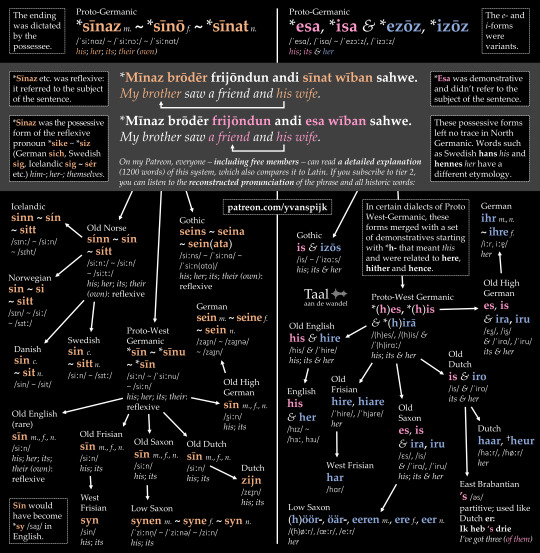
Old as sīn
In certain dialects of Old English, there were two ways to express 'his' and 'her'. Beside his and hire, there was sīn (pronounced ‘seen’), but this pronoun was reflexive: it could only refer to the subject of the sentence. My new infographic and the article below tell you the whole story.
On my Patreon, everyone – including free members – can read a detailed explanation (1200 words) of this system, which also compares it to Latin. If you subscribe to tier 2, you can listen to the reconstructed pronunciation of the phrase and all historic words.
#historical linguistics#linguistics#language#etymology#english#dutch#german#old dutch#old english#old high german#old saxon#low saxon#old frisian#west frisian#gothic#old norse#danish#swedish#icelandic#norwegian#lingblr
86 notes
·
View notes
Text
Love how in Dutch “verb” is werkwoord (work-word) and in West Frisian it is tiidwurd (time-word)
51 notes
·
View notes
Text
ragedaisy replied to this post:
ah yes I recently learned Frisian and English are related languages that's so cool, but how intelligible is Frisian to English speakers? (I speak Dutch and English and I can *sort of* understand Frisian)
IIRC, the Frisian languages are the closest "relatives" to English in the language family trees apart from Scots, but considered mutually unintelligible. I've heard recordings of West Frisian (in linguistics courses) and I can sort of hear the similarity, but it's more like similar vibes than something I can actually understand.
Like, this—
Us Heit yn 'e himel, lit jo namme hillige wurde, lit jo keninkryk komme, lit jo wil dien wurde op ierde likegoed as yn 'e himel. Jou ús hjoed ús deistich brea en ferjou ús ús skulden sa't wy ús skuldners ek ferjûn hawwe; en lit ús net yn fersiking komme, mar ferlos ús fan 'e kweade; want jowes is it keninkryk en de krêft en de hearlikheid oant yn ivichheid.
—is unreadable to me at least, unless I know what to look for.
11 notes
·
View notes
Photo
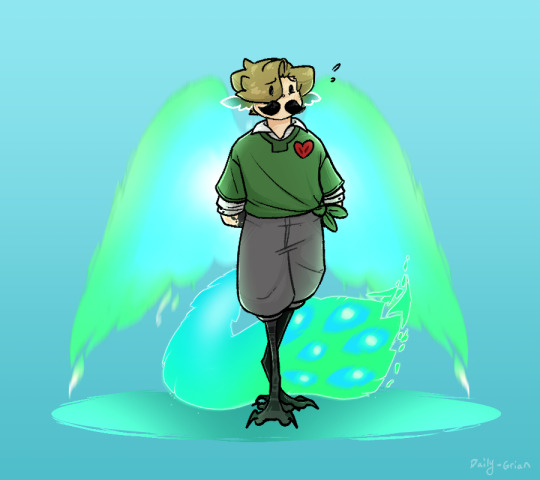
Dying? In hardcore? Noooo, couldn’t be him. You must be thinking of a different bird-themed British Minecraft youtuber-
#mcyt#grian#grien#grian fanart#daily-grian#100 hours hardcore#100 hours smp#apparently ''Grien'' means ''Green'' in West Frisian?#the more you know#mod owl
995 notes
·
View notes
Text
Some nations and their birth/death date
- Britannia : born around 800BCE (beginning of British Iron Age); died around 500CE, but she had been getting weaker ever since Rome's forces left.
- Rome : born in 753BCE (Rome's fonding); died in 476CE, for obvious reasons
- Gaul (celtic) : born around 700BCE (between the Halstatt and La Tène cultures); died not long after the Gallic wars in 52BCE
- Germania : born around 750BCE (Nordic Iron Age) died not long after Rome's fall
- Frankish Kingdom/Empire: died in 843 (Treaty of Verdun), son of Germania
- Burgundian Kingdom/State: died in 1482 (end of the Burgundian War of Succession), daughter of Germania
- Frisian Kingdom: died 1523 (end or Frisian Freedom after a failed Frisian rebellion), son of Germania (and is either the biological or the adopted father of the Low Countries (or at least the Netherlands))
- France: born shortly before the Gallic Wars, son of Gaul
- England: born around 500 CE (first Anglo-Saxon kingdoms), he would fully become his "own" in 927 with the Kingdom of England, son of Britannia
- Spain: born somewhere during the Roman era, son of Rome
- Portugal: same as Spain, but earlier, son of Rome
- Netherlands: born shortly before the Roman conquest of Gaul (Belgae), son of idk who yet
- HRE: born in 486CE, when the Franks beat the Soissons Domain; died 1806 for obvious reasons, son of the Frankish Kingdom
- Middle Francia/Lotharingia: born in 843CE (Treaty of Verdun); died either 958CE (division of the Kingdom of Lotharingia) or 1190CE (Lower Lotharingia lost its territorial authority), daughter of the Frankish Kingdom
- Austrasia & Neustria: born in 511CE, died in 751CE, those boys were literally twins and they started the tradition of ✨️fratricide✨️ in the family (later carried on by France killing HRE), sons of the Frankish Kingdom
- Prussia: born 1226CE (creation of the State of the Teutonic Order)/born 1th century CE if we consider him an Old Prussian (Baltic tribe), son of how do I know
- Germany: born...1806(Confederation of the Rhine), 1815(German Confederation), 1866 (North German Confederation) or 1871 (Proclamation of the Reich)
Or he's HRE according to some... I don't know he's complicated...
#feel absolutely free to propose other dates if you don't agree or think there can be another date#very west european/germanic centred sorry :(#i have no idea when Germania's children would be born tho so uh yeah sorry#mes blogs#hetalia#historical hetalia#aph rome#aph germania#aph gaul#aph britannia#aph frankish empire#aph burgundian state#aph frisian kingdom#aph france#aph england#aph spain#aph portugal#aph netherlands#aph hre#aph lotharingia#aph austrasia#aph neustria#aph prussia#aph germany#ill stop here thanks-#hetalia headcanons
43 notes
·
View notes
Text
gotta go on my yearly hunt for cool metal bands that are not european* or english speaking US americans to broaden my language horizon
#*minority languages excluded i'm eating up the limburgish and west frisian#still mourning the nahuatl and maori speaking bands i really wanted to like but the music style just didnt work for me#alas im a picky listener#but i wanna listen to languuuuages and whats better for that than music
10 notes
·
View notes
Photo
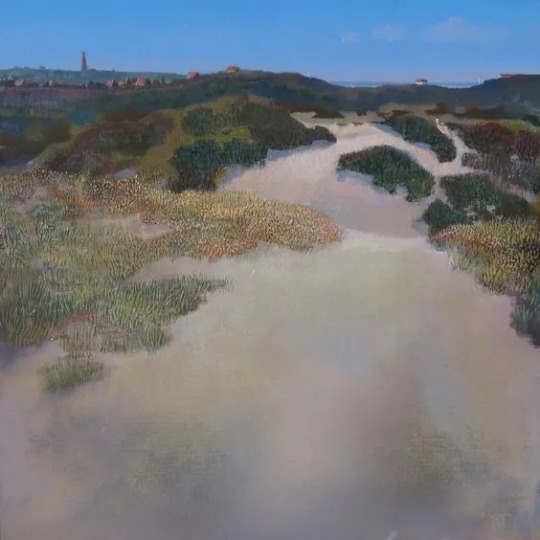
Schiermonnikoog - Ton Dubbeldam
Dutch, b.1957-
Oil on panel , 45 x 45 cm
#Ton Dubbeldam#dutch artist#dunes landscape#Schiermonnikoog#island landscape#Friesland#West Frisian Islands
120 notes
·
View notes
Text
so I’m researching west frisian and dutch low saxon rn and man I fucking love language
#I love you phonetics I love you dialects I love you preservation of endangered languges#browsing through the page on west frisian in frisian (which I don’t speak but can understand fairly well apparently) and reading it out loud#I’m definitely not getting everything right but I’m having fun#and also the phonetics part on the dutch low saxon page. how have I never realised that ol diphtongated (?) to ou#elli rambles#about the dutch lower saxon it’s like. I don’t speak it but my autistic ass tends to accidentally pick up accents/dialects#which is why I say stuff like mossekieke (instead of moet je kijken) bakkie pleur (bakje koffie) or zuurbrand (maagzuur)#despite only really speaking standard dutch#languageposting
8 notes
·
View notes
Text
Anglo-Frisian Perspective on the Pronunciation of Old Norse Ǫ
Anglo-Frisian Perspective on the Pronunciation of Old Norse Ǫ
Written by Dyami Millarson
Can you imagine the Vikings roaming around in this forest and talking with each other casually in Old Norse and as it so happens, utter a few ordinary Old Norse words that contain the vowel sound ǫ?
Old Norse distinguishes the rounded back vowels o and u-umlaut-derived ǫ (i.e., a + u = ǫ, or more properly according to linguistic convention: a + u > ǫ, where > means…

View On WordPress
#East Frisian languages#Frisian language family#North Frisian languages#Old Norse phonology#phonological reconstruction#reconstructed phonology#u-mutation#u-umlaut#West Frisian languages
0 notes
Photo
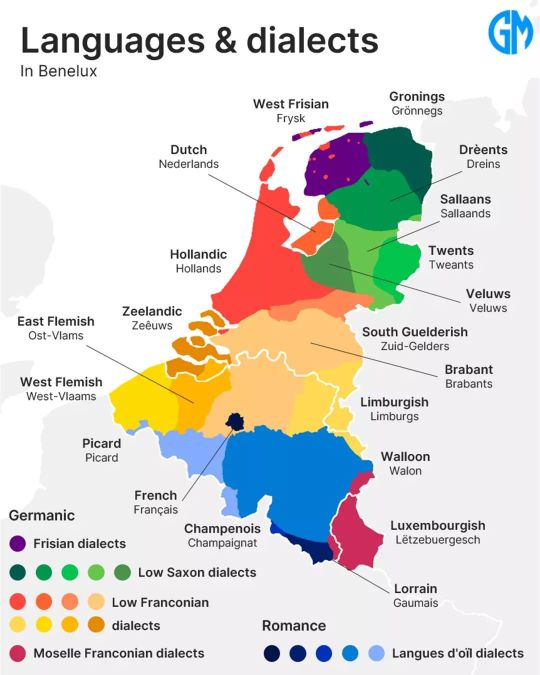
Languages & dialects in BENELUX 🇳🇱🇧🇪🇱🇺
NOTE: French, Dutch, West Frisian and Luxembourgish are languages, while Flemish and Limburgish can be considered separate languages as well.
by geomapas.gr
265 notes
·
View notes
Text
A look at the etymology of the "arithmonyms" from the Locked Tomb series by Tamsyn Muir, arranged by difficulty level.
Easy:
-Deuteros = Ancient Greek δεύτερος (deúteros) "second"
-Dve = Pan-Slavic две/dvě "two"
-Tettares = Ancient Greek (Attic) τέττᾰρες (téttares) "four"
-Chatur = Sanskrit चतुर् (catur) "four"
-Pent = Ancient Greek πέντε (pénte) "five"
-Quinque = Latin quīnque "five"
-Sextus = Latin sextus "sixth"
-Hect = Ancient Greek ἕκτος (héktos) "sixth"
-Sex = Latin sex "six"
-Septimus = Latin septimus "seventh"
-Asht = Sanskrit अष्ट (aṣṭa) "eight"
-Oct = Latin octō "eight" or Ancient greek ὀκτώ (oktṓ) "eight"
-Nav = Sanskrit नव (nava) "nine"
Intermediate:
-Dyas = Ancient Greek (late medieval pronunciation) δῠᾰ́ς (duás) "the number two, couple, pair, diad"
-Tern = Latin ternī "three each, three at a time"
-Trinit = Latin trīnitās "the number three, triad, trinity"
-Tetra = Ancient Greek τετρᾰ́ς (tetrás) "the number four, the fourth day", or τετρα- (tetra-), prefixed form of τέττᾰρες (téttares) "four"
-Quinn = Latin quīnī "five each, five at a time", or quīn-, prefixed form of quīnque "five"
-Shodash = Sanskrit षोडश (ṣoḍaśa) "sixteen"
-Ebdoma = Ancient Greek (Koine pronunciation) ἑβδομάς (hebdomás) "a group of seven"
-Nonagesimus = Latin nōnāgēsimus "ninetieth"
-Novenarius = Latin novēnārius "containing or consisting of nine things"
-Novenary = Latin novēnārius (see above)
Advanced:
-Tridentarius = Neo-Latin tridēntārius "like a trident", from Latin tridēns "three teeth"
-Zeta = Sixth letter of the Greek Alphabet (although in Ancient Greek numerals it actually represents the number 7, because the original sixth letter was the now disused digamma)
-Heptane = Neo-Greek-Latin compound heptane, "saturated aliphatic hydrocarbon C7H16" (more literally "pertaining to the number seven, seven-like")
-Nonius = Latin Nōnius, a first name derived from the Nōnia plebeian family, ultimately from nōnus "ninth"
-Nova = Latin novem "nine" and/or nova "new" (it's been suggested that the Proto-Indo-European root *h₁néwn̥ "nine" is derived from the root *néwos "new")
Expert:
-Octakiseron = Ancient Greek ὀκτᾰ́κῐς (oktákis) "eight times" + unclear suffix, could have been constructed by analogy with -τερον (-teron, as in δεύτερον (deúteron) "second") and -μερον (-meron, as in ἑξαήμερον (hexaḗmeron) "six days"); alternatively based on or reinforced by the French diminutive suffix -eron, an extension of the diminutive -on (itself a merger of several Latin and Frankish suffixes), built by analogy with words like quarteron "quadroon" (from quartier "quarter, district" + -on); yet another possibility is Ancient Greek εἴρων (eírōn) "one who says less than they think, dissembler, pretender"
-Noniusvianus = not clear, perhaps a portmenteau of Latin Nōnius (see above) and noviēs "nine times", with an adjectival ending -(i)ānus.
-Nigenad = perhaps based on Proto-West Germanic *nigundō "ninth" (variant of the more common *neundō), or one of its descendants (Dutch negende, Middle English nyghend, West Frisian njoggende…); possibly reinforced by Old English nigonfeald "ninefold"
#the locked tomb#gideon the ninth#harrow the ninth#nona the ninth#arithmonym#etymology#tamsyn muir#linguistics#latin#greek#sanskrit#numbers#germanic#indo european#slavic#worldbuilding
231 notes
·
View notes
Text

The word island and the names Jersey, Scandinavia, and Batavia all contain a descendant of the same Proto-Germanic word: *awjō-: 'land in or close to a body of water'. This infographic - which I had a lot of fun designing - shows how these words (and others) are related.
#historical linguistics#linguistics#language#etymology#english#latin#dutch#german#low saxon#west frisian#old frisian#old english#proto-west germanic#old norse#icelandic#norwegian#swedish#danish#gothic#proto-germanic#proto-indo-european#lingblr
113 notes
·
View notes
Text
Write
From Middle English writen, from Old English wrītan, from Proto-West Germanic *wrītan, from Proto-Germanic *wrītaną (“to carve, write”), from Proto-Indo-European *wrey- (“to rip, tear”).
Cognate with West Frisian write (“to wear by rubbing, rip, tear”), Dutch wrijten (“to argue, quarrel”), Middle Low German wrîten (“to scratch, draw, write”) (> Low German wrieten, rieten (“to tear, split”)), German reißen (“to tear, rip”), Norwegian rita (“to rough-sketch, carve, write”), Swedish rita (“to draw, design, delineate, model”)
to write is to rip, tear, argue, split, rough-sketch, design, delineate, model
21 notes
·
View notes
Text
I like finding words where you go "I wonder what the etymology on this is" and as far back as the reconstructions manage, the word means the same thing.
Like, "horse" derives from PIE *ḱr̥sós (“vehicle”), from PIE *ḱers- (“to run”). So somewhere in the record, someone saw a running thing and said "I could ride that". Or "squirrel" comes from Greek σκίουρος (skíouros) "shadow-tail"
In contrast, you have "cow":*
From Middle English cou, cu, from Old English cū (“cow”), from Proto-West Germanic *kū, from Proto-Germanic *kūz (“cow”), from Proto-Indo-European *gʷṓws (“cow”).
So as far back as we can tell, our ancestor saw a cow and went "yup, that's a cow".
Some of the same things happen for basic words like "fire", "water", "sun" (but not "sky", which seems to go back and forth with the meaning of "cloud"). Which makes sense. Super basic words are most likely to be preserved. It's just interesting to see which ones ended up getting Darkmok'd along the way.
*The entire Indo-European language family is in agreement that, yes, that is a cow.
Cognate with Sanskrit गो (go), Ancient Greek βοῦς (boûs), Persian گاو (gâv)), Latvian govs (“cow”), Proto-Slavic *govędo (Serbo-Croatian govedo, Russian говядина (govjadina) ("beef")), Scots coo (“cow”), North Frisian ko, kø (“cow”), West Frisian ko (“cow”), Dutch koe (“cow”), Low German Koh, Koo, Kau (“cow”), German Kuh (“cow”), Swedish ko (“cow”), Norwegian ku (“cow”), Icelandic kýr (“cow”), Latin bōs (“ox, bull, cow”), Armenian կով (kov, “cow”).
The Sumerian word is also close enough that linguists think it is related. But nobody is entirely sure which direction the borrowing would have gone (from the Sumerian language to an early Proto-Indo-European, or the other way around).
59 notes
·
View notes
Text
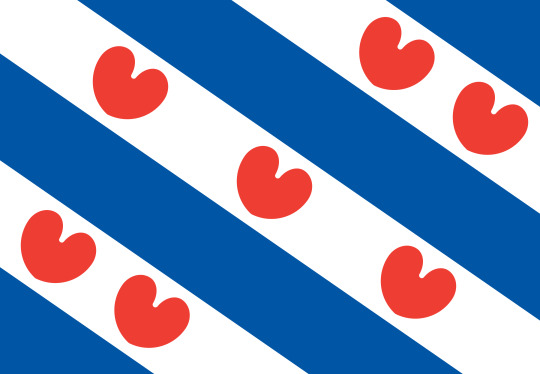
The flag of the province of Friesland or Frisian flag (West Frisian: Fryske Flagge; Dutch: Friese vlag), is the official flag of the Netherlands province of Friesland.
It consists of four blue and three white diagonal stripes; in the white stripes are a total of seven red pompeblêden, leaves of the yellow water-lily, that may resemble hearts, but according to the official instructions "should not be heart-shaped". The jerseys of the football club SC Heerenveen and the Blauhúster Dakkapel [fy] are modeled after this flag. (Wikipedia)
8 notes
·
View notes
Note
you’re frisian as in from the islands off the coast of the netherlands? my family comes from there :3
No, we're not West Frisian; my paternal family is East Frisian and my maternal family is North Frisian - but hi neighbour 👋🏼😁
My dad and grandparents on my dad's side speak some kind of Low German (I have no idea what exactly it's called, NOT Sater Frisian), and my grandparents and great aunt on my mum's side used to speak a North Frisian variation, but speaking Frisian was prohibited multiple times in Germany, so after WW2 they weren't really exposed to it anymore and now don't understand much. Which is a pity, as we retrieved some old letters a while ago and they don't understand a word, unfortunately... 🙈
(Don't get me wrong, their North Frisian variation is actively revived, but re-learning it is hard when you're in your 70's and 80's... They're a little envious that West Frisian is represented in Google Translate as "Frisian" but not North Frisian)
9 notes
·
View notes